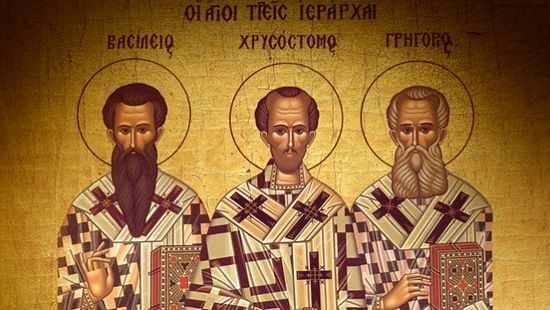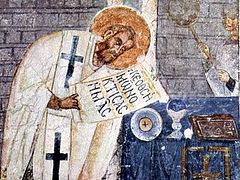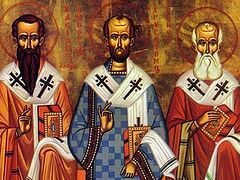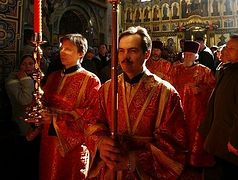The following homily was written for a homiletics course at St. Tikhon's Seminary and delivered in the church at St. Tikhon's Monastery on the commemoration of the Three Holy Hierarchs in 2013:
* * *
Let us who love their words gather together
and honor with hymns the three great torch-bearers of the
triune Godhead:
Basil the Great, Gregory the Theologian and John
Chrysostom.
These men have enlightened the world with the rays of
their divine doctrines.
They are sweetly-flowing rivers of wisdom
filling all creation with springs of heavenly
knowledge.
Ceaselessly they intercede for us before the Holy
Trinity!
These are the words of exalted praise that we offer to Sts. Basil the Great, Gregory the Theologian, and John Chrysostom today. They have filled the whole world with divine doctrines, wisdom and heavenly knowledge. These three saints, the Three Holy Hierarchs, are the patron saints of seminarians, and it’s not hard to see why. In their lives and writings they show us what true theology and true wisdom really is, and this is a lesson for all Orthodox faithful, not just the seminarians. In our culture we are very much enamored with the human ability to reason, and our own intelligence. In the western tradition, reason and philosophy have been made the handmaidens of theology. And the very nature of a seminary, with its academic setting, offers us this temptation. Even though we have the monastery here offering us the daily services, and our professors constantly reminding us that all they teach us must be supported by a life of prayer, it can be easy for us to become focused simply on the intellectual side of our studies. But these three great saints that we celebrate today are a great reminder to us that in our Orthodox Tradition this is not what theology is. For us, true theology is a life of prayer, it is the vision of Christ in glory such as Peter, James and John experienced on Mt. Tabor, and ultimately true theology is the Person of Christ Himself, and it is this which Sts. Basil, Gregory, and John communicate to us, as they speak and write from a position of Divine vision. No one has ever reasoned himself into communion with God, but it comes to us only by the Mystery of the Lord’s Cross.
Today’s Gospel presents us with a choice—the way of the Cross, or the way of men. As Christ spoke to His disciples of His coming Crucifixion, St. Peter took Him aside and rebuked Him—He did not want our Lord to go to His Cross, which means, by extension, that St. Peter did not want to have to take up his own Cross. And if we reject our crosses then we will hear from the Lord: “Get behind Me, Satan! For you are not mindful of the things of God, but the things of men.” The things of men, as an alternative to the way of the Cross, may appeal to our pride, but God resists the proud. It is only once we have crucified and sacrificed everything that is of ourselves that we will be able to pray to God from the depths of our hearts and find communion with Him. Our minds are a gift from God, but they become a true blessing once they are crucified before the wisdom of God in the Church.
Sts. Basil, Gregory, and John understood this fundamental truth of the spiritual life and they have passed it on to us. St. John Chrysostom preached to his flock that “There is nothing worse than that man should measure and judge of divine things by human reasonings," but rather, we must follow the path that St. Basil lays out before us. In his Hexaemeron, an explanation of the six days of creation, he writes “We are proposing to examine the structure of the world and to contemplate the whole universe, not from the wisdom of the world, but from what God taught His servant when He spoke to him in person and without riddles.” The saints teach us from the heights of Divine vision and not from any constructs of the clever workings of their own minds, and this is why we can praise them as “sweetly-flowing rivers of wisdom, filling all creation with springs of heavenly knowledge”—because their knowledge is truly from Heaven. St. Gregory the Theologian said of St. Basil at his funeral, “Whenever I handle his Hexaemeron, and take its words on my lips, I am brought into the presence of the Creator, and understand the words of creation, and admire the Creator more than before, using my teacher as my only means of sight.” A work of theology that has such power to lift us above this world is surely from God and not from men.
The Thee Holy Hierarchs whom we celebrate today combated ancient heresies that threatened the Church, and they have left us innumerable works of theology and spirituality. But they show us that what was at stake was not a mere system of theological constructs, it wasn’t just words that were being threatened by heresy, but rather that theology is beholding the face of God, and ultimately is the Person of Christ Himself. From these fathers, and all the fathers, we learn that the content of theology, the entirety of the Christian spiritual life, is the Mystery of the Cross, which shapes the ethos of repentance—our prayerful striving to become like Christ in all things—in the Orthodox Church. They are a good reminder to us seminarians, and to all Orthodox faithful, to not rest contented with knowledge in our heads about the history and dogmas and spirituality of the Church, but to fervently plead the Lord that this knowledge would move from our heads into our hearts and become a lived experiential knowledge in which we find true communion with God, and become filled with the fire of grace, that we too may become “great torch-bearers of the triune Godhead.”




